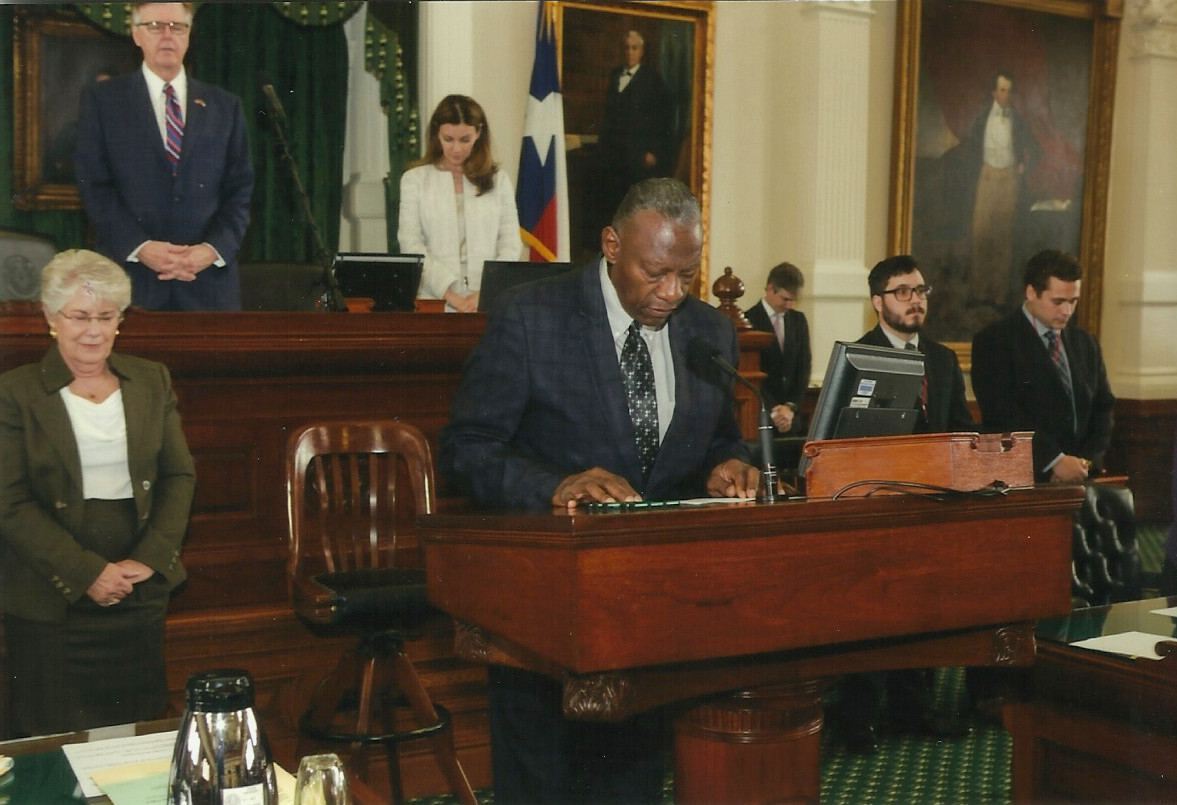‘Don’t give up, keep the faith’
Sampleton’s journey from slums to state recognition
Gonzales High Alum Bishop George Sampleton was honored at the Capitol last year for his dedication to the civil rights movement. Growing up through those tough times, Sampleton penned a book, in hopes of inspiring others to withstand their own hardships and persevere.
Texas House Resolution 517, authored by Texas Representative John Cyrier of Lockhart, states “Sampleton of Inspiration Pentecostal Church of the Apostolic Faith in Bastrop has dedicated himself to serving both his faith and the cause of justice, and he is truly deserving of special recognition during Black History Month.”
That was in 2017.
Now, Sampleton has penned his life story in a book called “Don’t Give Up Keep The Faith” to try to inspire individuals to rise up, like he did when he lived in Gonzales decades ago.
“It doesn’t matter where you came from,” Sampleton explained. “It’s where you’re going. I just want to let people know. I’ve reached a plateau in my life, I’m in the records book in the capitol, in the university…that’s what motivated me to write this back.”
Senate Resolution 242 helps further explain his upbringing. The resolution honored Sampleton for being “a pioneering community leader who persevered during the tumultuous years of the civil rights movement” and despite being in the midst of trauma and continual setbacks, he “stayed committed to the highest principles of social activism and helped pave the path for equality with determined, peaceful resistance.”
A man born into poverty, Sampleton recalls a time where his family was essentially a nomadic group, moving “here and there, back and forth.”
“My dad only made $18 a week,” he recounted. “There were six of us in the family. We had cardboards up to the windows to keep the air out. We had a wood stove. We would get the lid off the stove itself and wrap it up in some old clothes and put it in the bed to warm our feet and whatnot. The house was leaking, it was unlivable. We would move so many times in Gonzales until we were considered nomads, without a home.”
Those hardships showed in school, where Sampleton was looked down upon because of his upbringing. Growing up through segregation, he knew all about “hand-me-downs,” especially in the classroom.
“The books that we got were 10 years behind time because we got them from Gonzales High School,” the pastor said. “The band equipment, the horns, the baseball equipment, the track equipment, we had all hand-me-downs. The things we were learning, they already moved on to something higher. That motivated me to write this book.”
Even after integration, Sampleton was still treated as sub-human. Anytime an incident occurred at the newly-integrated Gonzales High, black students were lined up and interrogated one-by-one to find the culprit. After graduation, despite an integrated ceremony, class reunions were essentially segregated, with the whites attending their reunions at Gonzales High and the blacks needing to find a place for their own reunion, Sampleton said.
His experiences growing up didn’t deter him. Surviving homelessness, Sampleton is now revered preacher who has received awards from state legislators.
“Think about this, here I come from Gonzales, raised in the ghetto, and I come back with all these awards,” he said. “Think about that. It takes time. It takes motivation. It takes commitment. It takes persistence.”
“People will see this in the paper and say, ‘wow, how could that happen?’ How could that not happen?” Sampleton pushed back.
Sampleton draws inspiration from Dr. Martin Luther King Jr.’s words.
“Dr. King said something that would last with me, that’s been instilled in my psyche and will stay with me for the rest of my life,” Sampleton said. “It’s not about burn baby burn, it’s about learn baby learn.”
“I want [readers] to know that even though I went through the abuse…they will see how I handle this situation,” he continued. “I accepted it, but handled it in a different way, instead of getting a gun or tying a bomb around my waist. Use the pen. And people can read about it.”
“[I want readers to] see the book and say, ‘George did it, why can’t I?’”
“Don’t Give Up Keep The Faith” is available at the Robert Lee Brothers Jr. Memorial Library here in Gonzales.
Comments







